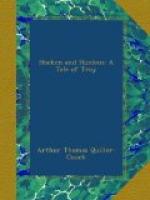“This is better than ploughin’, ma’am?” challenged Cai in his glee.
“So much better,” agreed the widow, smiling up, “that I’ve almost a mind to forgive the pair of you.”
“But I won’t ask you to stay for dinner to-day,” she said later, when the tangled mass of the Devoniensis had been separated, shoot from shoot, and pegged out to the last healthy-looking twig, and the two men stood, flushed but safe, on the pathway beside her. She stole a confidential little glance at Cai. “For I understand from Captain Hocken that you prefer to make your excuses separately. I have already forgiven him: and it’s only fair to give Captain Hunken his turn.”
Who less suspicious than Cai? Had he been suspicious at all, what better reassurance than the sly pressure of her hand as he bade her good-day? . . . Poor ’Bias!
Once past the gate, and out of sight, Cai felt a strange desire to skip!
“Well, mistress, you are a bold one, I must say!” commented Dinah that night by the kitchen fire, where Mrs Bosenna enjoyed a chat and, at this season of the year, a small glass of hot brandy-and-water, with a slice of lemon in it, before going to bed.
“I don’t see where the boldness comes in,” said the widow. She was studying the fire, and spoke inattentively.
“Two hundred pounds!”
“Eh? . . . There’s no risk in that. You may say what you like of Captain Hocken or of Captain Hunken: but they’re honest as children. The money’s as safe with them as in the bank.”
“Well, it do seem to me a dashin’ and yet a very cold-blooded way of choosin’ a man. Now, if I was taken with one—”
“Well?” prompted Mrs Bosenna, as Dinah paused.
“Call me weak, but I couldn’t help it. I should throw myself straight at his head, an’ ask him to trample me under his boots!”
“A nice kind of husband you’d make of him then!” said her mistress scornfully.
“I know, I know,” agreed Dinah. “I’ve no power o’ resistance at all, an’ I daresay the Almighty has saved me a lifetime o’ trouble. ‘Twould ha’ been desperet pleasant at the time though.” She sighed.
“But to give two men a hundred pound each, an’ choose the one that manages it best—”
“Worst,” corrected Mrs Bosenna. “You ninny!” she went on with sovereign contempt. “Do you really suppose I’d marry a man that could handle my money, or was vain enough to suppose he could?”
“O—oh!” gasped Dinah as she took enlightenment. . . . “But two hundred pounds is a terrible sum to spend in findin’ out which o’ two men is the bigger fool. Why not begin wi’ the one you like best, and find out first if he’s foolish enough to suit?”
“Because,” answered Mrs Bosenna, turning meditative eyes again upon the fire, “I don’t happen to know which I like best.”
“Then you can’t be in love,” declared foolish Dinah.
“Sensible women ain’t; not until afterwards. . . . Now, which would you advise me to marry?”




